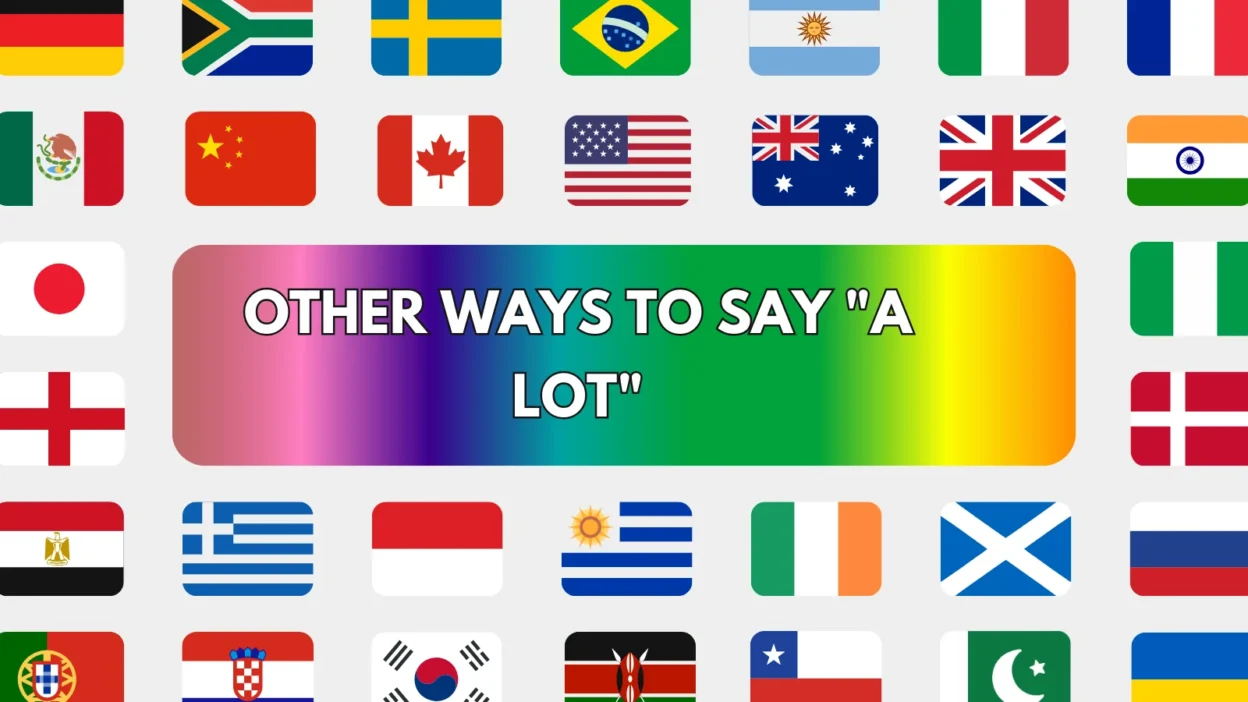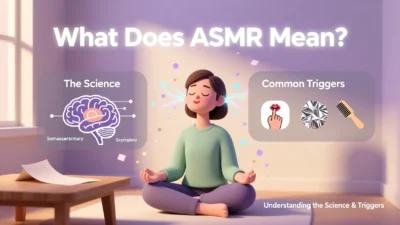The phrase “a lot” is one of the most commonly used expressions in English to describe large amounts, quantities, or frequency. While it’s widely understood and convenient, using it too often — especially in writing — can make your language feel vague or repetitive.
That’s why it’s helpful to learn alternative ways to say “a lot” that better match your tone, context, and message. Whether you’re writing professionally, speaking casually, or trying to be more descriptive, the following 25 alternatives will give you variety, clarity, and flair.
1. Many
Meaning:
Refers to a large number of countable items or people.
Detailed Explanation:
“Many” is more precise than “a lot” when talking about things you can count — like books, people, or events. It’s commonly used in both formal and informal situations.
Scenario Example:
There were many students at the seminar.
Best Use:
Academic writing, general communication.
Tone:
Neutral, clear, formal or informal.
2. Numerous
Meaning:
Means a large number of something.
Detailed Explanation:
“Numerous” adds a formal, polished tone. It’s great when writing reports, essays, or articles where variety and precision matter.
Scenario Example:
The company received numerous complaints last month.
Best Use:
Professional writing, academic content.
Tone:
Formal, intelligent, authoritative.
3. Plenty
Meaning:
Indicates a more than sufficient quantity or number.
Detailed Explanation:
“Plenty” carries a positive, relaxed vibe and often implies there’s enough to go around.
Scenario Example:
There’s plenty of food for everyone.
Best Use:
Casual writing, speech, friendly tone.
Tone:
Warm, informal, assuring.
4. A Great Deal
Meaning:
Refers to a significant amount or large portion.
Detailed Explanation:
Often used to talk about emotions, money, time, or abstract ideas.
Scenario Example:
She cares a great deal about her students.
Best Use:
Emotional or reflective writing.
Tone:
Thoughtful, formal or emotional.
5. A Large Number Of
Meaning:
Specifies a high quantity of countable things.
Detailed Explanation:
More formal and detailed than “a lot,” perfect when discussing statistics or measurable data.
Scenario Example:
A large number of tourists visited the island this year.
Best Use:
Reports, academic writing.
Tone:
Precise, formal, neutral.
6. Tons Of
Meaning:
An informal phrase to describe a very large quantity.
Detailed Explanation:
Adds enthusiasm or exaggeration, often used in casual speech or writing.
Scenario Example:
We had tons of fun at the festival!
Best Use:
Conversations, blogs, informal content.
Tone:
Excited, playful, friendly.
7. A Bunch Of
Meaning:
Describes a collection or group of things or people.
Detailed Explanation:
Informal and conversational, often used in everyday speech.
Scenario Example:
I saw a bunch of people waiting outside.
Best Use:
Casual speech, friendly tone.
Tone:
Relaxed, informal.
8. A Wealth Of
Meaning:
Refers to an abundance, especially of knowledge, experience, or resources.
Detailed Explanation:
“Rich” in meaning, often used in professional or academic contexts.
Scenario Example:
The guide provides a wealth of information.
Best Use:
Professional, educational, promotional writing.
Tone:
Positive, respectful, professional.
9. Scores Of
Meaning:
Refers to a large number, often in multiples of twenty.
Detailed Explanation:
More poetic or literary, “scores” adds variety and flair.
Scenario Example:
Scores of people lined up to get tickets.
Best Use:
Storytelling, journalism, creative writing.
Tone:
Dramatic, classic, descriptive.
10. Heaps Of
Meaning:
A casual way of saying there’s a lot of something.
Detailed Explanation:
Common in British English and informal speech, “heaps” adds cheer or emphasis.
Scenario Example:
She’s got heaps of energy.
Best Use:
Conversations, informal writing.
Tone:
Cheerful, casual, energetic.
11. Loads Of
Meaning:
Means a very large quantity, often of things or time.
Detailed Explanation:
Similar to “tons of,” “loads of” is friendly and light-hearted.
Scenario Example:
They gave us loads of feedback.
Best Use:
Spoken English, casual writing.
Tone:
Fun, informal, relaxed.
12. A Vast Amount
Meaning:
Describes an impressively large quantity.
Detailed Explanation:
“Vast” emphasizes scale, especially in serious or formal contexts.
Scenario Example:
The research revealed a vast amount of data.
Best Use:
Scientific reports, research papers.
Tone:
Formal, analytical.
13. Abundant
Meaning:
Means plentiful or more than enough.
Detailed Explanation:
Often used with natural resources or positive qualities.
Scenario Example:
The area is known for its abundant wildlife.
Best Use:
Environmental writing, descriptive essays.
Tone:
Elegant, positive, descriptive.
14. An Excess Of
Meaning:
Refers to more than is necessary or healthy.
Detailed Explanation:
Usually implies too much — with a slightly negative connotation.
Scenario Example:
He consumed an excess of sugar.
Best Use:
Health writing, critiques, academic work.
Tone:
Cautionary, critical, formal.
15. A Myriad Of
Meaning:
Means countless or a great number of diverse things.
Detailed Explanation:
Adds sophistication and variety to writing.
Scenario Example:
The city offers a myriad of dining options.
Best Use:
Creative writing, travel blogs, essays.
Tone:
Elegant, expressive, creative.
16. Countless
Meaning:
So many that they cannot be counted.
Detailed Explanation:
Adds drama or emotion, especially when describing long-term efforts or effects.
Scenario Example:
She made countless sacrifices for her family.
Best Use:
Emotional writing, narratives.
Tone:
Emphatic, sentimental, intense.
17. A High Volume Of
Meaning:
Refers to a large amount, especially in measurable data or production.
Detailed Explanation:
Used in technical, business, or academic contexts.
Scenario Example:
The website experienced a high volume of traffic.
Best Use:
Data reports, business analysis.
Tone:
Formal, technical, factual.
18. A Substantial Amount
Meaning:
Refers to a large and significant quantity.
Detailed Explanation:
Slightly more conservative than “tons of,” but more formal and trustworthy.
Scenario Example:
They donated a substantial amount to charity.
Best Use:
News, business, professional writing.
Tone:
Credible, formal, balanced.
19. Extensive
Meaning:
Means wide-reaching or covering a large area or range.
Detailed Explanation:
Used for data, research, or efforts.
Scenario Example:
The team conducted extensive testing.
Best Use:
Academic, business, scientific writing.
Tone:
Precise, formal, detailed.
20. Overflowing With
Meaning:
Implies something is full to the point of spilling over.
Detailed Explanation:
Often used metaphorically with emotions or abundance.
Scenario Example:
Her heart was overflowing with joy.
Best Use:
Creative, emotional writing.
Tone:
Warm, expressive, poetic.
21. More Than Enough
Meaning:
Indicates a generous surplus or excess.
Detailed Explanation:
Adds reassurance and confidence.
Scenario Example:
We have more than enough supplies for the trip.
Best Use:
Encouraging language, reassuring tone.
Tone:
Comforting, supportive, calm.
22. Beyond Measure
Meaning:
Describes something so great it can’t be quantified.
Detailed Explanation:
Dramatic and heartfelt, great for emotional depth.
Scenario Example:
She loved her children beyond measure.
Best Use:
Literature, speeches, poetic language.
Tone:
Intense, emotional, powerful.
23. Copious
Meaning:
Means abundant in quantity or detail.
Detailed Explanation:
Often used with notes, writing, or resources.
Scenario Example:
He took copious notes during the lecture.
Best Use:
Academic or technical writing.
Tone:
Formal, intelligent, refined.
24. Galore
Meaning:
Means “in abundance” — usually follows the noun.
Detailed Explanation:
Adds flair and fun to descriptions.
Scenario Example:
The store had discounts galore!
Best Use:
Marketing, storytelling.
Tone:
Playful, vivid, informal.
25. Infinite
Meaning:
Describes something so large it’s without end.
Detailed Explanation:
More figurative than literal, adds drama or grandeur.
Scenario Example:
He had infinite patience with his students.
Best Use:
Poetry, spiritual or deep writing.
Tone:
Philosophical, intense, dramatic.
Conclusion
The phrase “a lot” is useful — but overuse can flatten your writing. By using these 25 vibrant alternatives, you can be more specific, engaging, or professional depending on the context.

Hadi Bhatti is a passionate writer and content creator at Saypadia, known for turning complex words, phrases, and internet slang into simple, easy-to-understand explanations. With a strong interest in language, meanings, and digital communication, Hadi focuses on helping readers understand what words really mean in everyday use. His writing style is clear, engaging, and user-focused, making learning both practical and enjoyable.




